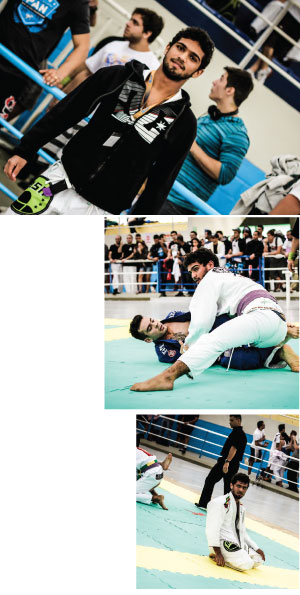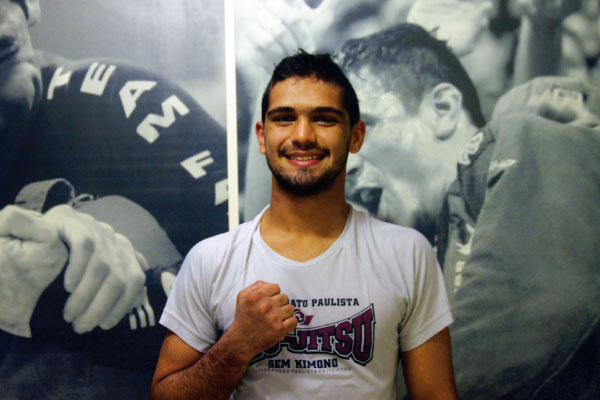Picking a fight is what he does for a living. (When you’re that good, who wouldn’t?) We speak to Ali Monfaradi, who prides himself on his skills as a professional jiu-jitsu fighter.
While his surname gives away how he got into the world of martial arts, Ali Monfaradi has made a name for himself as a professional jiu-jitsu fighter on a global scale. Fighting for Alliance BJJ, Monfaradi has many titles to his name.
He’s the 2012 World Jiu Jitsu champion (lightweight) and runner-up (absolute division), the 2012 Pan American champion (lightweight) and second runner-up (absolute division), Brazilian Nationals champion, two-time São Paulo Open champion (2012-13) and multiple-time São Paulo state champion. Did we mention this was all before he turned 20?
Woman This Month (WTM): Tell us about your jiu-jitsu career.
Ali Monfaradi (AM): I started training at the age of 12 under my uncle, Reza Monfaradi, at Alliance Bahrain, Reza’s Martial Art Centre. Immediately after finishing my high school exams, I had to leave to Long Beach, California to fight in the World Championship (where I got thrid place), and then move to São Paulo, Brazil, where the best academy in the world — Alliance SP — is located.
With a six-month deadline, I had to learn Portuguese as universities don’t teach in English, and then get into a university. This should not mislead you in any way. Education is crucial. But I am in Brazil for one reason, and one reason only; that is to make my wildest Brazilian jiu-jitsu dreams come true.
I train as much as is physically possible, eat as clean as I can, and compete every time the opportunity presents itself. I like to think of my self as very passionate about jiu-jitsu. I love to train; right now I train for five to six hours a day! I love to fight, and I especially, love to compete. Nothing tests your jiu-jitsu like complete strangers, who are looking to defeat you just as much as you looking to defeat them.
 WTM: Has the fact that your father and uncle train played a role in you finding an interest in the combat sport?
WTM: Has the fact that your father and uncle train played a role in you finding an interest in the combat sport?
AM: Absolutely! For as long as I can remember, I always wanted to train with my dad and uncle. As soon as Reza started the children’s class, I was the first to join and I never missed a class.
WTM: What do you plan to achieve in Brazil?
AM: Many things. Perhaps there are goals I haven’t even set yet, but the most noteworthy for now I suppose would be getting my black belt under Fábio Gurgel, winning the world championship as many times as possible, and becoming an unforgettable legend in the sport! The last one is more of an aspiration as opposed to a goal.
WTM: What have been your biggest challenges in reaching your goals?
AM: Staying away from the people I love the most. I am a passionate guy in more than one way. I must say I love my friends and family very much. Luckily, over the last three years, I have made a new family right here in Brazil.
WTM: Tell us about your experience at the Brazilian Nationals?
AM: Well what can I say; I couldn’t have been more ready. I was stronger, fitter and more technical than ever. I knew for a fact that I was the best guy in the category. Consequently, I got over excited and was looking forward to getting the medal more than I should have, instead of enjoying one fight at a time.
At a subconscious level, my brain didn’t put in 100 percent because it felt like it wasn’t going to be necessary. Somewhere in the middle of the fight, I made a small mistake — one I won’t be making again — which ultimately cost me the match.
WTM: In Bahrain, it can be considered a very gutsy move to take on jiu-jitsu as a profession. How did you make that decision?
AM: To tell you the truth, it’s considered to be pretty insane here too! (laughs) Well I suppose that at an early age of 14 years, the decision was made for me. My uncle told me with utmost certainty, “Ali, you are going to become a World Champion.”
He believed in me even when I didn’t believe in myself. At the time, I was overwhelmed and couldn’t believe him. To this day, I wonder what made him so sure.
WTM: Being as dedicated as you are to the sport, how do you think someone can stay passionate about their goals and still enjoy life?
AM: I don’t know how to answer that. If you love something enough, I don’t think you can lose your passion for it so easily. As for enjoying life, I guess I could say that I am.
I learned an entire new language and became the first world champion from my country. I am learning amazing techniques every day, under the best of the best, making my body capable of things I’ve never imagined. I’m travelling the world, meeting people, making friends and most importantly, doing what I love the most.
I am enjoying life. It’s a consequence of what I do as opposed to something I should give up.
WTM: What’s the hardest thing about being thousands of miles away from home (besides doing your own laundry, to quote your blog)?
AM: Doing the dishes, having to cook healthy food even when I’m tired, running errands, riding a bike, going to the bank, explaining to my mom how to use technology over the phone…the list goes on and on! (laughs)
WTM: So, if you weren’t into jiu-jitsu, what do you see yourself doing?
AM: I actually have a list of things I would do! But mostly I think I would be a writer or journalist. I am a big fan of classic literature and good existentialist novels. If I lose a limb or something, I would still train! But I imagine I’d have some time to write as well.
WTM: At 20 years, you’ve achieved quite a lot. How do you keep your ego in check?
AM: It’s not easy. Your ego is something you should constantly be aware of — and constantly reset. If you lose your humility, you lose every last chance of ever achieving your dreams. You do not want to find that out the hard way.


































